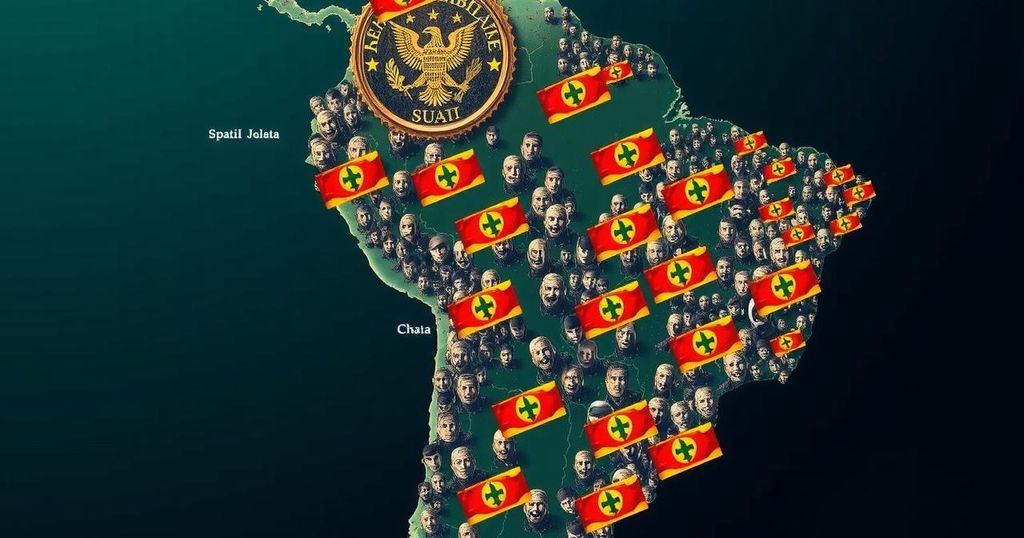Global news
ARGENTINA, AUSTRAL UNIVERSITY, BARAKAT, BOLIVIA, CALLE, CAROLINA TOHA, CHILE, CUBA, DIAL, ECONOMIC SANCTIONS, EMANUEL, FOREIGN POLICY, FOUNDATION FOR THE DEFENSE OF DEMOCRACIES, HEZBOLLAH, INFOBAE, INTERNATIONAL RELATIONS, IQUIQUE, IRAN, LATIN AMERICA, NORTH AMERICA, PATRICIA BULLRICH, SANCTIONS, SECURITY, SOUTH AMERICA
Marcus Li
0 Comments
Hezbollah Expands Its Influence in Latin America: Iran’s Strategic Moves
Iran, alongside Hezbollah, has expanded its influence in Latin America through illicit activities in countries such as Bolivia, Brazil, Chile, Colombia, and Paraguay. Argentine Security Minister Patricia Bullrich raised concerns regarding Hezbollah’s presence, particularly in the Triple Border area and noted the group’s connections to local drug trafficking networks. Experts emphasize the need for enhanced intelligence sharing among regional authorities to address the challenges posed by these terrorist organizations.
Iran, in coordination with Hezbollah, a Lebanese militant organization, has significantly expanded its operational footprint across various nations in Latin America. This expansion is evidenced by illicit activities occurring in strategic locales including Bolivia, Brazil, Chile, Colombia, and Paraguay. In April, Argentine Security Minister Patricia Bullrich confirmed the heightened vigilance concerning Hezbollah’s presence in the Triple Border area, which encompasses Paraguay, Brazil, and Argentina, as well as in Iquique, a northern region of Chile. An alleged report shared with the Chilean government outlined Hezbollah’s activities in Chile and emphasized the involvement of the Barakat family, purportedly providing financial and logistical support to the organization. Fabián Calle, an International Relations professor at Austral University in Argentina, noted that Hezbollah has been documented in Latin America since the 1990s. He explained that the organization expanded globally, capitalizing on Lebanese communities that emerged following Lebanon’s civil war. Political analyst Emanuele Ottolenghi further corroborated the established presence of Hezbollah in countries like Chile and Bolivia, linking its networks to the region’s escalating drug trafficking issues, which Hezbollah exploits for laundering purposes. Calle remarked that intelligence reports indicate an alarming growth of criminal networks associated with Hezbollah in Bolivia and Chile, underlining a concerning dynamic regarding Iran’s attempts to entrench its influence in Latin America. Additionally, a French publication reported possible Hezbollah operations in Bogotá, Colombia, emerging from a religious center supposedly serving as a conduit for Iranian influence. This location, the Ahlul Beyt Islamic House, reportedly facilitates outreach activities through cultural programs. The association of Hezbollah with drug trafficking has been identified as a significant funding avenue for the organization, posing a substantial threat to the rule of law in the region. Despite Paraguay’s President Santiago Peña indicating a decrease in terrorist operations in the Triple Border, he cautioned that the nexus between organized crime and terrorism remains perilous. Ely Karmon, a researcher at the Counter-Terrorism Institute, pointed out that Hezbollah’s activities are mostly rooted within Shiite communities residing in trade areas throughout Latin America. Calle emphasized the importance of inter-agency cooperation among intelligence and law enforcement officials to address these threats effectively.
The topic of Iran and Hezbollah’s activities in Latin America has gained attention due to growing concerns over their influence in strategic locations within the region. This interest is particularly acute in the context of Hezbollah’s historical presence, which dates back to the 1990s amid emigration spurred by Lebanese civil unrest. Reports indicate that both entities exploit local conditions of weak governance to engage in various illicit activities, complicating security dynamics in Latin America. The implications extend beyond mere criminal acts, threatening the stability of governmental institutions and the international balance of power in the region.
The evidence presented highlights the ongoing efforts by Iran and Hezbollah to establish and expand their influence in Latin America through various illicit activities linked to organized crime and drug trafficking. The interconnectedness of these entities poses significant risks to national and regional security, underscoring the need for enhanced cooperation among intelligence agencies. Vigilant monitoring and collaborative strategies are essential to mitigate the potential threats to stability in the region. Regional authorities must remain alert to the evolving dynamics of these organizations and their operations.
Original Source: dialogo-americas.com




Post Comment